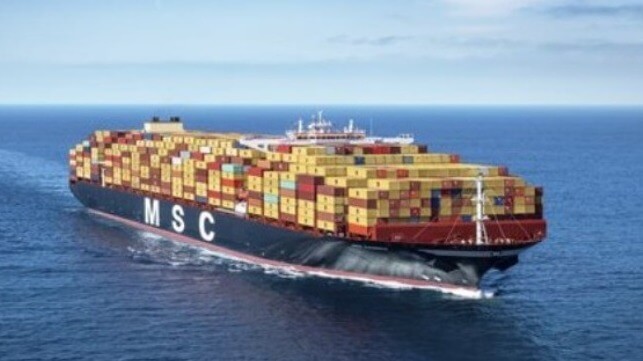MSC Tops Schedule Reliability as Two-Thirds of Boxships are on Schedule

For the sixth consecutive month, container shipping schedule reliability has been above 60 percent nearing levels not seen since 2020. After a low when only one-in-three ships were on schedule, the sector has rebounded although it plateaued with an average of just under 64 percent monthly schedule reliability since February 2023.
“Schedule reliability remained unchanged month-over-month in July 2023 at 64.2 percent, maintaining the slightly lower level than the peak reached in May 2023,” highlights Alan Murphy, CEO of analytics firm Sea-Intelligence. “On a year-over-year level, however, schedule reliability in July 2023 is still 23.8 percentage points higher.”
Sea-Intelligence analyzes schedule reliability across 34 different trade lanes and more than 60 carriers, reporting in its monthly update that the industry has remained above 60 percent every month since February 2023. While it is still below the 75 percent reported three years ago in July, it has significantly improved from 35.5 percent in July 2021 and 40.3 percent in July 2022.
The declines in volumes which helped ports to clear their backlogs have contributed to the improvements in schedule reliability for container carriers. In addition, they continue to blank sailings and combine routes which has helped to reduce the number of vessels, yet much of the recovery comes from improvements in operations.
Mediterranean Shipping Company (MSC) despite being the largest carrier with 780 vessels according to Alphaliners’ rankings, jumped on Sea-Intelligence’s schedule reliability charts from the middle of the pack in 2022 to lead the sector in 2023. They nearly doubled their reliability over the past year surpassing 70 percent and putting them slightly ahead of Maersk (69.9 percent) and Hamburg Sud (66.9 percent) which have consistently led the industry.
Year-over-year all the top 14 largest carriers report strong improvements in their schedule reliability ranging between 40 and 125 percent. The average is similar to the overall industry, with the top 14 carriers at just over 61 percent, and even the lowest, Yang Ming and HMM, are each above 50 percent.
While the industry and the top carriers are showing strong year-over-year improvements, schedule reliability peaked in May 2023 and has slipped back slightly. Six of the top 14 are reflecting declines in their reliability from June to July. COSCO and OOCL showed the largest declines at just over nine percent month-over-month, while Wan Hai reflects a 16 percent improvement versus June and HMM also achieved an eight percent improvement.
“The average delay for late vessel arrivals on the other hand deteriorated by 0.21 days month-over-month to 4.59 days,” says Murphy. “This is the first substantial increase of the year and after two months of stability at 4.37 days.”
Yet while the delays have been increasing, they overall show strong progress similar to schedule reliability from the lows experienced during the pandemic and the surge in container volumes. The industry remains behind 2019 levels but is consistent with 2020 and significantly improved from delays that were approaching eight days in late 2021 and 2022.

that matters most
Get the latest maritime news delivered to your inbox daily.
Fitch Ratings in its most recent ratings on port operators notes that it expects “U.S. and Canadian ports will see cargo volumes level off in the coming months with the broader economy inching closer to a possible recession.” The steady volumes are expected to provide further relief for port operators, terminals, and carriers giving them time to further improve operations and prepare for future volume increases. The problems at the Panama Canal, where draft restrictions are expected to persist, however, are a new emerging challenge to the the industry. Currently, there are 135 ships waiting for the transit and due to the water restrictions some containerships have been forced to offload and transship boxes across the isthmus to meet the restrictions.
